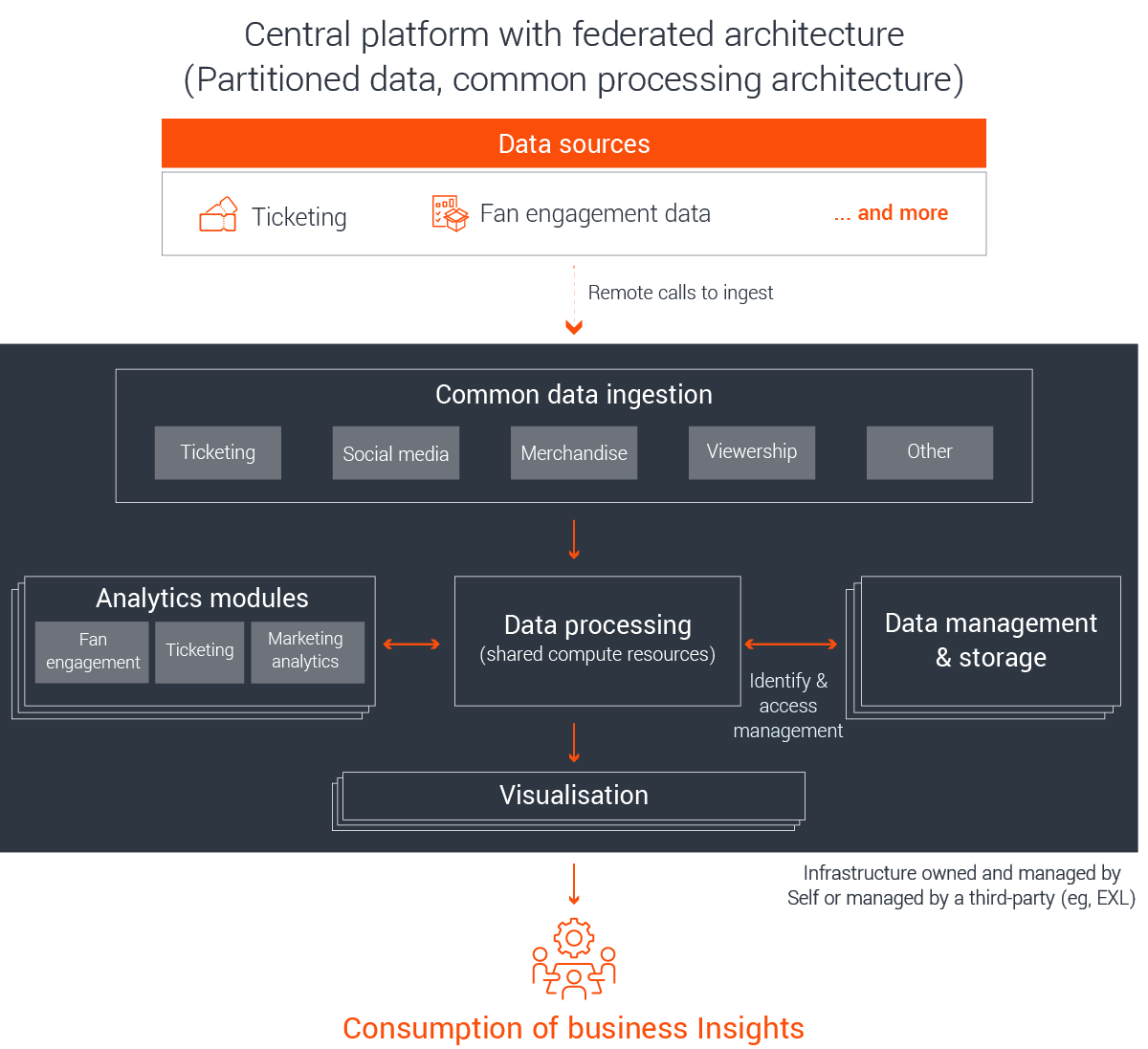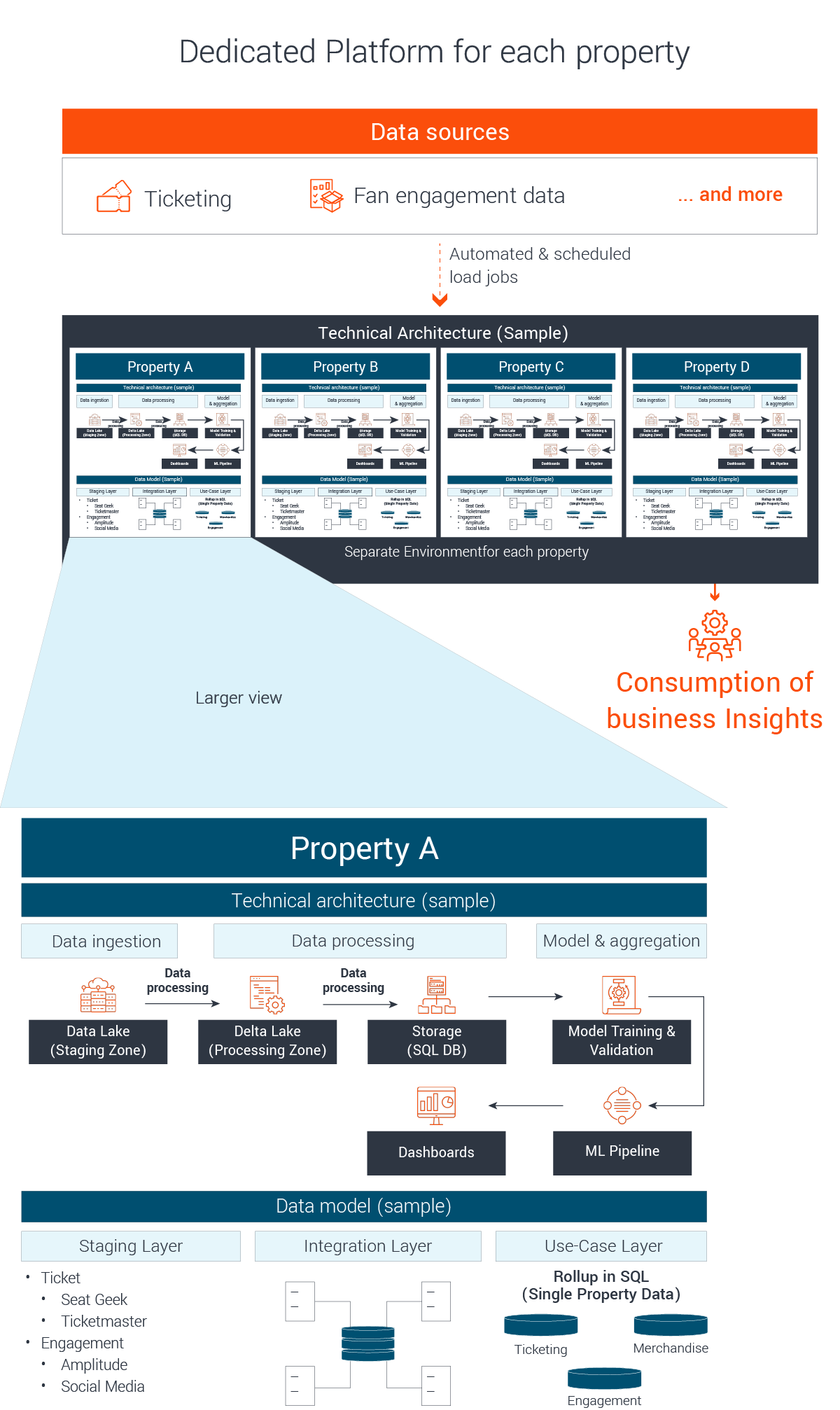Data analytics and AI for multi-club ownership groups
A new model for success in the world sports ecosystem
Sir Jim Ratcliffe’s imminent investment in Manchester United to buy a 25% stake in the club has put multi-club sports ownership in the limelight once again. Ratcliffe’s Ineos Group already has several football clubs including OGC Nice, FC Lausanne- Sport, and Racing Club Abidjan, a Cycling Team INEOS Grenadiers and Formula 1 Team Mercedes-AMG Petronas in their portfolio. However, they are not alone in their quest to expand their dominion in the jock kingdom. The popularity of multi-club ownership (MCO) has gained traction across the industry in recent years.
Anschutz Entertainment Group (AEG) was an early adopter of the MCO model in the 2000s, with their investments spanning teams, arenas, and entertainment ventures. AEG pioneered the MCO model with its acquisition of the Los Angeles Kings NHL team back in 1995 and the Los Angeles Galaxy MLS team in 2002. Other investment groups followed suit, including:
- City Football Group (Manchester City, New York City FC, Melbourne City FC)
- Red Bull GmBH (RB Leipzig, RB Salzburg, New York Red Bulls, Oracle Red Bull Racing, Scuderia AlphaTauri)
- RedBird Capital (AC Milan, Fenway Sports Group, Liverpool FC, Boston Red Sox)
- BlueCo (Chelsea FC and RC Strasbourg Alsace)
The MCO structure offers investor groups the opportunity to leverage synergy between resources and talent, drive common marketing efforts and fan engagement strategies, improve fan experience, and deliver added value to sponsors. And, one of the key enablers to accomplishing these goals is data.
Making sense of the data
While synergies on player scouting and performance have long been leveraged by MCO groups to improve club standings and records, leveraging fan data to optimize financial performance presents a different set of challenges. Fan data includes information on fan behavior and preferences, as well as transactional data, such as ticket sales, merchandise purchases, social media interactions, and more.
Smart owners apply advanced analytics to their data to improve fan experience and achieve business goals related to revenue opportunities and stickier engagement. However, fan data is also the subject of various global data privacy laws. As a consequence, MCO groups must take care that their usage of fan data and analytics architecture complies with the growing complexity of cross-border regulations and legislative bodies.
EXL has more than 20 years’ experience developing and implementing advanced analytics solutions, most recently in the areas of sports ticketing, fan engagement, and sponsorship analysis. For MCO groups looking to optimize outcomes through insights gleaned from fan data, this article provides an overview of the challenges, considerations, and best way to make sense of the data that drives sports brands forward.
Assessing the challenges of a winning MCO data infrastructure
Theoretically, each club within the umbrella of an ownership group could have its own data infrastructure, platform, partners, ML models, and so on. But as more owners adopt the MCO model, siloed data and analytics assets become impractical. Winning organizations will strive to synergize their efforts around a common operating platform that enables real-time visibility into operations and fan experiences to achieve competitive responsiveness with global scope.
Likewise, as ownership groups keep adding clubs to their portfolio over time, a scalable architecture is necessary to simplify the onboarding of new clubs under the brand. What savvy investor wants to pass on an opportunity because of a technology impasse? Better to review the current infrastructure and prepare for success in advance.
Last, and certainly not least, fan data must be handled responsibly across the organization according to various geographic privacy regulations. Risks may include fines, penalties, and reputational damage that can all be prevented using smartly engineered processes and technology to trigger early warnings and compile a creditable audit trail.
Data infrastructure challenges

Key considerations for advancing the ball
First, recognize that fans interact with clubs through a variety of channels, such as tickets, merchandise, fantasy gaming, digital and social media, and other forms of engagement. Fans typically accept that their club will use their data responsibly to provide them with a better fan experience. Hence, the architecture should enable integration of multiple data sources used by various clubs and their fans. Understanding the complexity of these engagements may require expert-led fan journey-mapping to start on the right foot.
A modular architecture can best support these various fan journeys, especially in an MCO group model, where data access is limited to relevant clubs, but data infrastructure is shared across the group portfolio. A single common cloud can accomplish this function by efficiently providing access to data models and analytics from any enabled device.
However, where multiple clubs can have the same solutions, modules, and even share the same platform, access to data for those codes must be restricted. This means that while components such as data models, data connectors, and data processing resources can be reused across different clubs, the architecture should ensure that the codes for training various ML models remain separate. There can be no overlap in implementation.
The architecture should ensure that a club can’t access the fan data of another club under the same MCO, and the architecture should comply with local data privacy guidelines to avoid regulatory scrutiny. Strong privacy policies must therefore be established to guard against data breaches and unauthorized access to sensitive information that may take9 place due to the number of clubs under the business umbrella.
Various game plans have been tried
EXL’s sports data analytics and AI experts have seen three potential architecture options deployed in today’s complex MCO environment. These include:
1. Central platform with federated architecture: An architecture which offers central cloud ownership and management and enables the group of properties to have access to shared data. Data is segregated for each property within the centralized platform. The MCO has further options of segregating the data for multiple clubs or segregating the environment on a cloud platform for multiple clubs.

2. Third-party platform with federated architecture: An architecture which offers a single cloud for all properties and is hosted and managed by a third-party provider. Data can be segregated for each property within the centralized platform. This option still allows the MCO to segregate the data for multiple clubs or segregate the environment on a cloud platform for multiple clubs.
3. Dedicated platform for each sports property: An architecture which allows each property to host and manage their own platform. Data for each property is stored within each distinct platform.
Of these, the central platform with federated architecture offers the greatest synergy, scale, and privacy combined.

Build to win
For MCO groups who want to address similar problems across their portfolio securely and efficiently, an architecture which offers central cloud ownership and management, and enables the group of properties access to shared resources on a single cloud platform with data privacy features enabled, appears to be the most suitable solution. Technology components such as analytical modules, compute resources, and ingestion pipelines could be reused across multiple teams to achieve economies of scale.
However, the infrastructure should ensure data privacy for all stakeholders, including the club, players, and fans through role-based access controls that restrict data sharing across teams. The entire architecture can be owned centrally, or better still, operated by a third-party expert, which would also facilitate speed in execution, access to best practices, quality, and the latest updates.
Take your game to the next level
Effective data management is crucial for the success of MCO models in sports. By establishing a centralized system for data management and implementing strong security protocols, owners can ensure consistency and protect sensitive information across all clubs, while extracting the maximum return on investment from their fan data strategies.
To learn more about how EXL sports data analytics and AI can improve your results in a modern MCO environment, please visit EXLservice.com.
Written by:
Anuroop Talwar
Vice President II – Sports Analytics
Agam Khurana
Vice President – Head Sports Analytics, EMEA
Abhishek Kumar
Engagement Manager – Sports Analytics
Mayank Pawar
Senior Consultant – Sports Analytics
